
Kerry demonstrates he's very much a yes person
I'll close today's coverage with the contribution from U.S. climate ambassador John Kerry, who appears to be speaking from his front room.
After framing the net zero energy system as “the largest market humans have ever known,” Kerry presented some sobering figures.
“I wasn't kidding when I said that this is a decisive decade,” he said. “We need to phase out coal five times faster than we have been doing, based on the rate seen between 2013 and 2018.
“We need to ramp up renewable energy about six times faster. We need to roll-out electric vehicles at a rate about 22 times faster.
“Can we do that? Yes. It's not a question of feasibility, it's a question of political goodwill.”

Von Der Leyen strikes determined note on carbon leakage
Overcoming my own technical inadequacies, I've finally been able to track down that keynote speech from European Commission president Ursula von der Leyen this morning–and it was well worth the hunt.
Saint Von Der Leyen, as she's known in these parts, returned to the subject of the steel industry more than once, opening with the efforts of Swedish manufacturers to invest in green-hydrogen-powered production, and that laid the foundations for her presentation of the EU's plans for a carbon border.
Illustrating the delicate diplomatic balancing act between encouraging China to get on board with the fight for climate change and admonishing the world's biggest carbon emitter for its record to date, Von der Leyen said: “Companies, to continue on their way to zero emissions… we must insist on fairness and a level playing field for them. Let me return, for the last time, to the example of steel, one of the most traded commodities in the world.
“We want European companies to heavily invest in expensive technologies to make steel green. Green steel costs around €100 more per ton than traditional, carbon-heavy-produced steel so, clearly, we have to prevent cheap products from abroad from undermining our efforts.”
Referring to the EU's planned ‘carbon border adjustment mechanism'– which Von Der Leyen admirably pronounced in full at every mention–she added: “We will impose a CO2 charge on certain products entering the European Union. We work so hard to reduce our emissions. Thus, we cannot accept to import, at the same time, emissions from abroad.”
That is a message which is likely to be warmly received in the White House and there is no need for any diplomatic tiptoeing in those relations, with Von der Leyen stating: “I must say we are really excited that President Biden rejoined the Paris Agreement on his very first day in office.”
The commission president, addressing the BETD event in her home nation, warned of the dangers of backsliding but was again unable to prevent the feeling the bloc is always forced to hold back on its ambitions due to the need for consensus among its 27 member states.
For instance, Von Der Leyen said: “Carbon must have its price, because nature cannot pay the price any more.” Strong words, but they referred only to a planned expansion of the EU emissions trading scheme (ETS) into new sectors such as the maritime industry. Although the commission president would go on to claim “Our European Green Deal will affect almost all aspects of our daily lives,” even an expanded ETS fails to slap a true carbon cost on all the interactions and decisions in our daily lives.
It is tempting to wonder what Vanessa Nakate would make of it all.
You know that Germany-Canada energy agreement...
It turns out the press conference which is, I presume, unfolding as we speak is only available in German so, pending publication of an associated English press release which has been promised by the BETD media team, we'll continue to be on hold until the studio resumes broadcasting at 1500.
Which will at least bring us blessed relief from this hold music.
German emissions
In among all the high-level green transition chatter today, it appears German energy minister Peter Altmaier this morning announced his country will hit its target of producing 40% less carbon emissions, by 2022, compared to 1990 levels. I must have missed that choice nugget of newsworthiness.
Of more pressing importance is the fact my rumbling tummy does not coincide with that of the delegates, who are currently engaged on a TWO-HOUR lunch break of the type most print journalists would be proud of.
There is that aforementioned Canada-Germany energy agreement to be signed in an hour or so, and the studio stuff is set to resume at 1500 so I'm going to shuffle seamlessly into pv magazine copy editing mode until 1430.
Ciao for now.
Where's the virtual bar, then?
It seems deputy minister Soltanov did not find time to answer my question although he did later add, on the topic of private versus public funding of renewables: “States are really good at things that states are good at,” with the same being true of corporates.
He elaborated: “States govern well and the private sector knows markets very well.”
We've also heard from Bianca de Bruijn-van der Gaag, of Dutch lender ING, who told us about her employer's global renewables activity–it seems almost churlish to mention that, upon arriving in Genoa 20 months ago I tried to open an account with ING and the local branch said it was no longer open for new customers. Maybe things have eased since then.
Anyhow, I'm going to wrap up the morning coverage so I can enjoy some reheated pizza from last night without the usual conference worry of having to negotiate limited, vastly overpriced menus.
Laterz.

Azerbaijan deputy minister faces a tough gig
It was interesting to hear the deputy energy minister of Azerbaijan laying out the clean energy ambitions of his oil and gas rich nation.
Speaking as part of a clean energy finance panel comprised of politicians from Jordan, Indonesia, Poland, and Azerbaijan, deputy minister Elnur Soltanov spoke of the green growth economy targeted by his nation and spelled out the $500 million committed in direct foreign investment from Saudi Arabia and the UAE towards clean energy projects “in the years ahead.”
pv magazine has tabled a question for the Azeri spokesman, asking how that compares with spending on oil and gas over the same, vague timeline.
Twitter?
Oh Lord help us, we're now having a summary of what is happening around the event in the ‘Twittersphere', whatever that is. The only thing I've read of interest this morning is Lye Town manager Grant Joshua complaining about the offside law…
Global youth can drive change
Belying his rather owlish demeanor as he stared over the top of his glasses and delivered solemn warnings, The IEA's Birol offered a surprising response when asked whether he was optimistic or pessimistic about the outcomes of this year's COP26 climate change summit in November.
“Definitely optimistic,” said the head of the International Energy Agency, who explained he had three reasons to be cheerful, starting with the political momentum seen around the world, and which can only gain pace with the return of the U.S. to the fold.
Secondly, said Birol, ever cheaper renewable technology makes one simple fact clear: “People will go for those [clean energy] options not only to save the world, but simply because they are cheaper.”
And finally, perhaps chastened by the powerful condemnation of climate activist Vanessa Nakate earlier on, Birol hailed the crucial role global youth could play in demanding an energy transition.
“I see the youth is behind this very strong momentum,” he added. “If the world's youth come together– and they are coming together–they can be a very strong engine for change.”
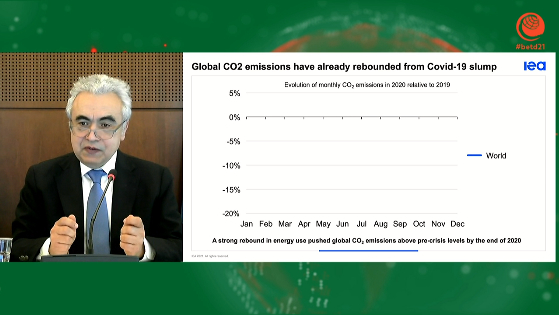
Global emissions are back higher than pre-Covid levels
International Energy Agency (IEA) executive director Fatih Birol has made the stark warning the world is in danger of missing “an historic opportunity to make the 2019 emissions … a peak.”
Birol said the IEA observed global emissions had rebounded higher than pre-Covid-19 levels by December, as economies around the world recovered from the pandemic.
“In the absence of decisive government policies,” warned Birol, “emissions will not go down.”
He has noted the lack of climate finance in developing nations as well as fears of a shortage in minerals for clean energy technology, including solar panels.
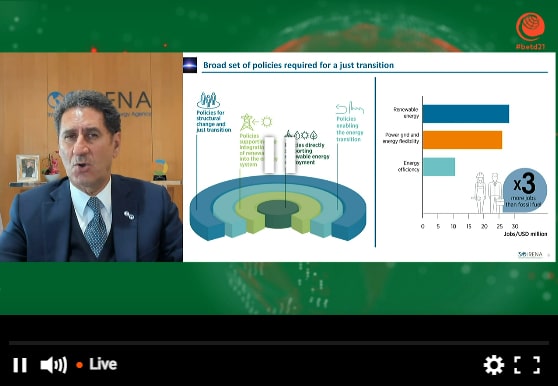
We need another $33tn to keep warming at 1.5C
We are back with IRENA boss Francesco la Camera, who is presenting a flagship report from his organisation which puts some figures on the energy transition.
With La Camera predicting renewable energy will do around a quarter of the heavy lifting towards a net-zero energy system in mid century, the IRENA director-general said there is currently $98 trillion needed to reach that goal.
However, doing so in a manner which will keep global warming to no more than 1.5C will require an additional $33 trillion, according to IRENA.
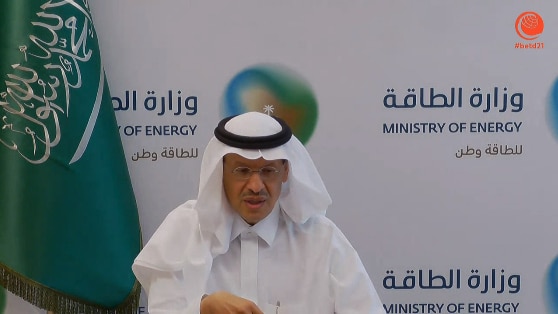
Saudi Arabia calls for just transition
Frustratingly, Saudi energy minister Abdulaziz bin Salman was cut short just as he was preparing to give an example of how a just energy transition means ensuring all nations have access to the technology required, rather than just a select few countries.
Bin Salman had said the energy transition would need to consider the situation in all of the world's nations, to be truly inclusive. That might have set the stage for a pitch for a tapering down of the fossil fuels Saudi Arabia is such a big exporter of, rather than the blunt cut-off required to meet the goals of the Paris climate agreement but we'll never know, because he was stopped by the moderator, who wanted to give Chinese politician Lin his say.
Technical problems...
Please forgive the tech problems we have, inevitably, encountered this morning–I think I've recovered all the blog posts which vanished now.
With all the kerfuffle caused by Vanessa Nakate's contribution, I've managed to miss Ursula von der Leyen's entire keynote speech. Ho hum, I'm sure she would agree Nakate's speech should take priority, including the allegation, made by the Ugandan activistn that she was banned, along with fellow speaker Brianna Fruean, from criticising any of the politicians taking part in BETD 2021.
Those speakers include Shangqing Lin, vice minister of China's National Energy Administration, who has just spoken of his nation's commitment to reaching the goal of carbon neutrality by 2060, albeit without fleshing out any concrete policy actions to be introduced to attain that goal.
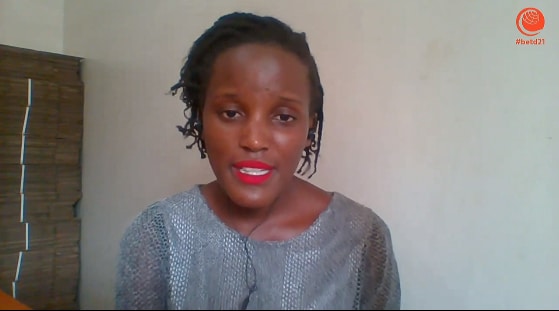
'Stop talking and start doing. We cannot eat coal and we cannot drink oil'
Young climate campaigner Vanessa Nakate has absolutely stolen the show already today with a stunning indictment of the big-name politicians which preceded her here at BETD 2021.
The Kampala-based youngster opened up to, presumably, stun the organisers by explaining her and fellow youth campaigner Brianna Fruean, from Samoa, had originally been given five minutes to make their points only to then have their allotted time reduced to four minutes, and then three-and-a-half minutes.
More infuriatingly for Nakate, both youngsters had to submit their speeches to the organisers in advance of the event–though presumably the address she courageously delivered on the live stream differed markedly from that transcript.
“Did any of the political leaders speaking today have their speeches submitted in advance?” asked Nakate. “Did any of them have their speech time cut short?
“You should not ask activists to come here and speak at events to make you feel better and then censor them.”
Delivering her stirring, Greta-style condemnation, the Ugandan activist told the likes of Altmaier and Maas it is time to stop talking and start doing. It is time to stop investing in uneconomical fossil fuel commitments because: “We cannot eat coal and we cannot drink oil.”
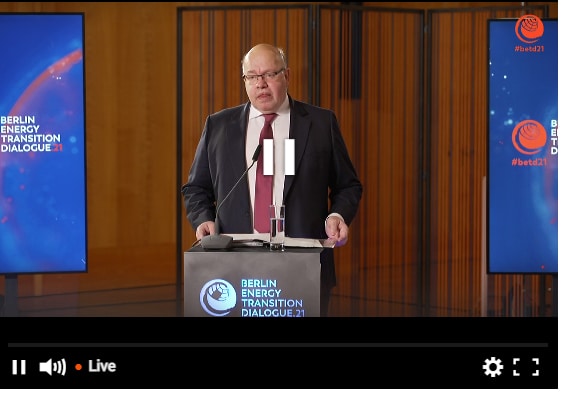
Altmaier is back
Altmaier–The Most Powerful Man in Berlin (TMPMiB)–is back center stage.
There is, perhaps inevitably a bit of repetition here as the energy minister again stresses the importance of America's return to the fold.
He has delivered the genuinely exciting news that European Commission president Ursula von der Leyen and U.S. presidential envoy for climate John Kerry will be taking part in BETD 2021. As he put it in a slightly starstruck vein: “Heiko Maas and I have both called him [Kerry] on the phone.”
The minister has spoken of how Germany defied the naysayers who said it would not be possible to transform the energy system of such an industry-heavy nation, especially one without vast hydropower resources. Germany has nonetheless reached the point where almost half its electricity comes from non-hydro renewables.
He is placing a lot of stress on the importance of green hydrogen to take us the rest of the way to net zero and has also mentioned the “tens of thousands of jobs” which will be created in Europe with the development of battery gigafactories.
Mentioning Elon Musk–and his alternative propulsion technology–won't be bad for the online visitor click numbers either.
We're not sure when Kerry and climate champion Von Der Leyen will be dropping in but we'll try and keep an eye on that one for you.
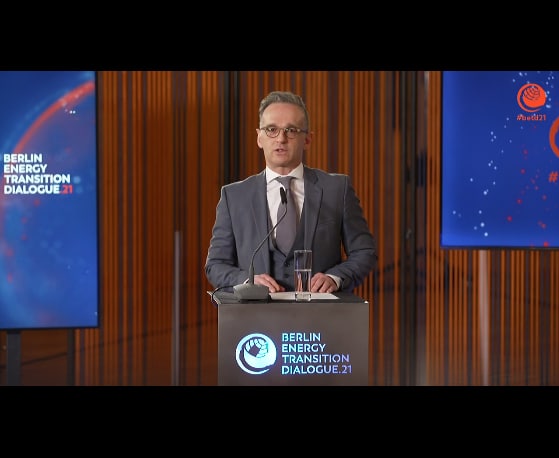
Now it's Heiko's turn
Apparently there's more going on!
Foreign minister Heiko Maas is giving an address in a different room, with a much nicer backdrop.
He is discussing what contribution green hydrogen can make to the energy transition and has touched on the fact fossil-fuel-dependent nations including Saudi Arabia and Russia must be helped to change their way of doing business. Apparently Germany already has people in both nations helping draft hydrogen policy.
And now, a word from our sponsors...
That's it for now folks, apparently all the live-event hullabaloo here at BETD 2021 is on hold until 1430 (CET) when we will have live coverage of the signing of an energy partnership between Germany and Canada.
Who signs first? Will they go biro or fountain pen–or maybe opt for the Trump route with a crayon? Oh the excitement!
Join us later, when we will hopefully also learn some details of what the partnership amounts to and, ideally, will be able to cut through the high-level ambition stuff and get our teeth into some real solar … not least because, now that the morning session has finished, I think I've worked out how to ask questions using the chat panel.
The U.S. is riding to the rescue
Herr Altmaier opened up with his best Elvis impression, stating: “It's now or never” for the energy transition.
He talked of how both the Green Deal for Europe and Germany's hydrogen strategy have been adopted by other global nations and appear set to swiftly become mainstream policy.
The federal minister for economic affairs and energy also welcomed the return of the U.S. to sanity (he may not have put it in precisely those terms but you get the drift).
“We have the huge opportunity that the U.S. has not only joined the climate agreement of Paris, but is playing a leading role in reaching climate neutrality,” said Altmaier.
“With the U.S. on board, it becomes an easier task, so I'm delighted John Kerry and Jennifer Granholm, the new energy secretary, have signaled they want to play a decisive role in that respect.”

The heavyweights are ready...
The ministers have taken the podium, that's German energy minister Peter Altmaier “the most powerful man in Berlin” on the left of the screen, and foreign minister Heiko Maas.
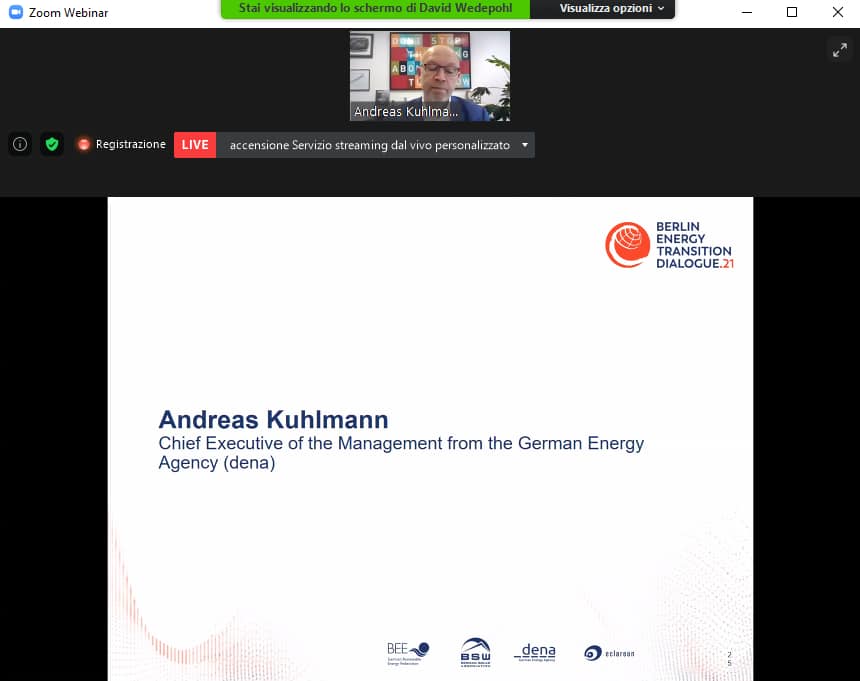
Head of the German Energy Agency
Andreas Kuhlmann, head of the German Energy Agency–which, for some unfathomable reason is initialised as ‘dena'–has suggested the Covid-19 crisis has permitted the world to hit the pause button and take stock of what needs to be done to achieve the climate goals set in Paris.
The organisers are doing a sterling job of filling until the German foreign minister is ready to give his thoughts. Apparently we will join Herr Maas in 10 minutes or so. His remarks will be translated into English, thank heavens.
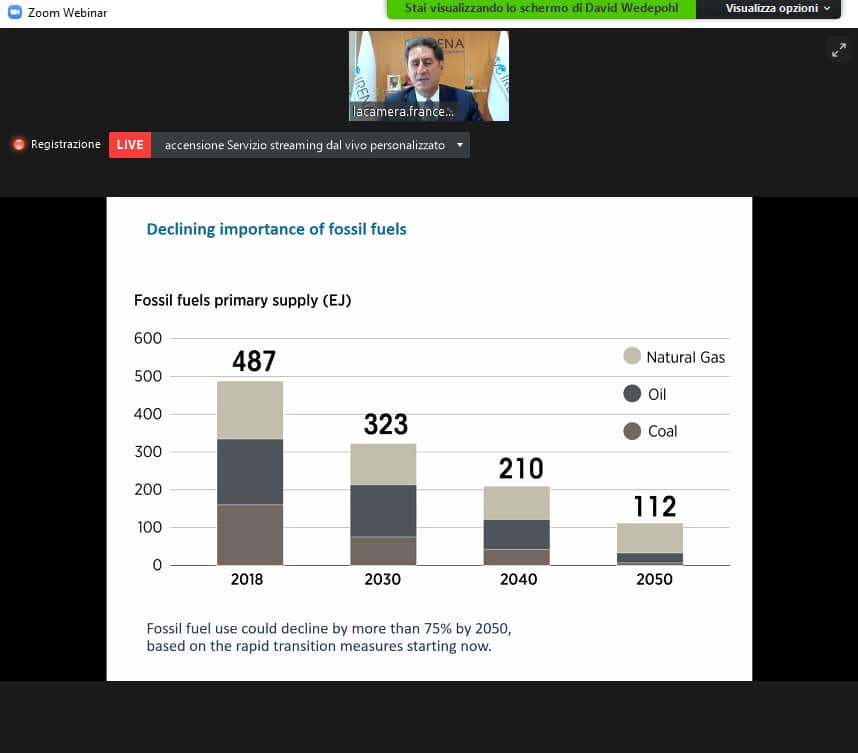
Francesco la Camera
Francesco la Camera, director-general of the International Renewable Energy Agency (IRENA) is laying out exactly what needs to be done to the global energy system to save the planet.
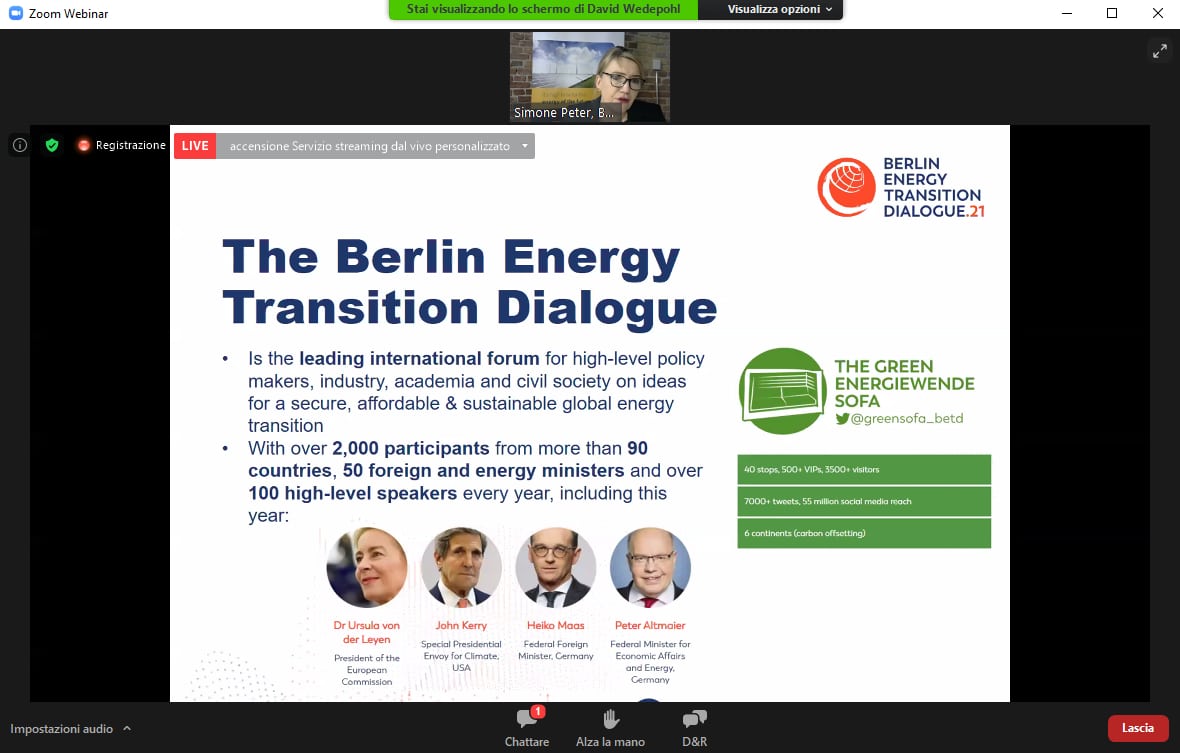
And we're off (shhhhh!)
It's been a predictably chaotic start to our coverage of the event, with me spooked by the fact I can find no obvious way of turning off my audio for the Zoom-hosted meeting.
Let's hope the German cabinet heavyweights won't be too perturbed by the sounds of the morning ablutions of the Zacco-Hall household and my suddenly-very-noisy-sounding tapping away at my keyboard.